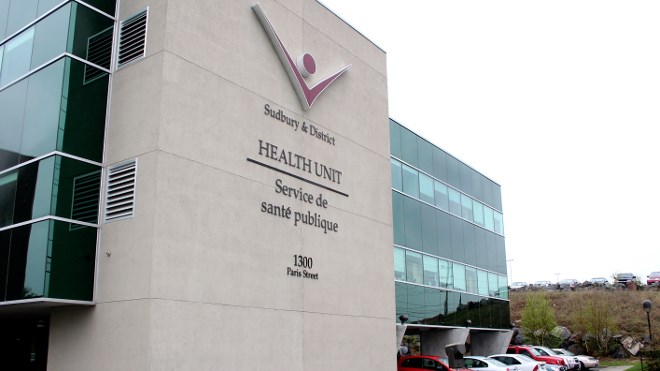Sudbury's board of public health has approved a $27.4-million budget for 2021 that is reported to be a spending increase of 1.5 per cent over the Public Health Sudbury and Districts budget for 2020.
The increase is estimated to represent a municipal per capita levy of $2.46 for every person living in the PHSD jurisdiction, which includes the City of Greater Sudbury and 17 surrounding towns and communities such as Espanola, French River and Chapleau.
The vote was not unanimous. One health board member, Randy Hazlett**, who represents the municipalities of French River, Markstay-Warren and St. Charles, suggested the per capita cost was the same as putting a health tax on people.
PHSD board member Carolyn Thain — who chairs the finance committee — explained that although the spending increase is only 1.5 per cent higher, the actual contribution from the member municipalities will be an increase of five per cent.
Part of the reason is because the province has cut back its share of funding for public health spending that kicked in on Jan. 1 of this year. The policy change saw Queen's Park cutting back its share of public health funding to 70 per cent, meaning local municipalities would be picking up the remaining 30 per cent.
Previously, Queen's Park would pick up 75 per cent of funding for local public health programs. In some cases it used to be 100 per cent paid by Ontario.
Then the pandemic happened. It meant spending priorities changed for every public health agency in Ontario, including PHSD. In August, Ontario’s Ministry of Health sent a letter to PHSD promising top-up funding of up to $2,249,900 for 2020 and up to $1,179,500 for 2021.
The 2021 budget estimate was questioned in light of the mitigation funding mentioned in the letter from the province. Hazlett wanted to know if any additional money was sent to PHSD as promised.
"What happened to the $2.2 million the government stated they would give us to cover the mitigation fund?" Hazlett asked.
Medical Officer of Health Dr. Penny Sutcliffe spoke to the details of the letter, but said PHSD has not submitted expenses on that money. Public Health clarified in an email to Sudbury.com that the health unit is not required to submit expense reports for the $2.2 million, as that was a one-time funding grant. The health unit does have to submit reports on funding that was announced in March by the province for health units to offset extraordinary pandemic-response costs. A costs-to-date report for that funding was filed in September, as well as a report on projected costs to the end of the year.
"And so the $2.2 million figure includes the $1,179,000 mitigation grant. It also includes other one-time funding that we were eligible for, for example the pandemic pay for nurses," Sutcliffe explained.
She added that most public health agencies in Ontario were faced with extraordinary costs that were not expected.
"So you will see that we have a deficit at this point in time," said Sutcliffe.
She added the expectation is that additional costs will be covered by the Ministry of Health to the end of the year, but as yet additional funding has not been received.
Hazlett asked if Sutcliffe believed the province would pay.
Lapierre jumped in to say anytime the board has a funding letter from the province the board would submit expenses and expect to be compensated.
Further into the meeting, Hazeltt said PHSD does a lot of work trying to help seniors and low-income residents, "yet you're passing a tax directly on to these individuals — seniors especially who are on fixed incomes who cannot afford an increase in their budgets,” said Hazlett.
"How do you feel about that?" Hazlett asked Sutcliffe.
Lapierre stepped in again to say he felt the question was "inappropriate".
He said because there is a per capita cost and because there is a budget it means that low-income people are getting the public health services they need at no cost to them individually.
Lapierre said if health services were based on a fee-for-service, then some people would not be getting any services. He said that is not the service mandate of public health.
"So I think that's the reason for the budget and for that type of increase, which I think of $2.46 per person per year, is a pretty good deal of an increase," said Lapierre.
Eventually the budget motion was put to a vote. All board members present voted to support the motion, except for Hazlett who voted against the motion.
**An earlier version of this story misidentified Randy Hazlett as another board member, Jeff Huska. The error has been corrected.
